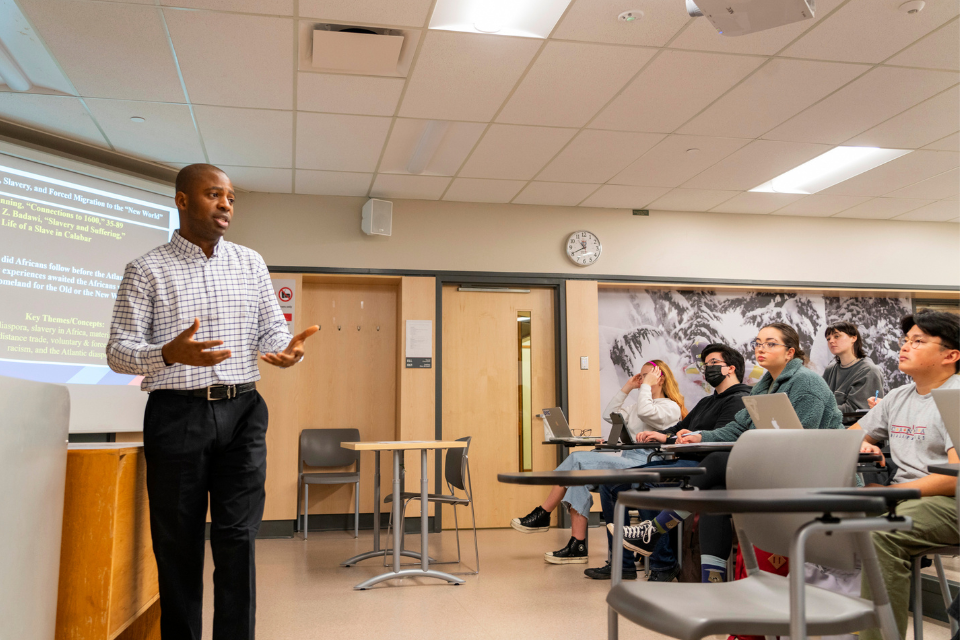Teaching Black history
- Philip Cox

Adebisi Alade is a UVic historian who specializes in African history. He was born and raised in Nigeria and has lived in Canada for six years.
This year, he designed two new courses on Black history for the Department of History, both of which focus on Africa and Black diasporic communities around the world.
In honour and celebration of Black History Month, we asked Alade to share with us his thoughts and insights into Black histories and Black History Month as he understands it.
Can you tell us about the two new courses on Black history you’re teaching at UVic right now?
I am currently teaching “Africa in the World,” which examines the varied experiences of Black people in the African diaspora across the globe going back to the 16th century, and “Africa since 1800,” which focuses primarily on modern Africa in the context of world history.
Through regional and local case studies, these courses provide students with an understanding of key themes and debates in African and Black diaspora studies, including the historical origins of voluntary and forced migration of Africans, European colonial rule, racial domination, the rise of nationalist movements, ideas and achievements of key Black figures, and the continuous struggle for racial and social justice.
From a global perspective, these courses teach students to think critically about how Africans responded to slavery and colonialism and how they coped with centuries of white exploitation. More importantly, the courses help students place the successes of Black people in the diaspora and the challenges of nation-building in modern Africa in historical contexts.
What do you think students gain from learning these histories?
UVic attracts students from diverse cultural and linguistic backgrounds; however, there are very few courses on Black and African history compared to European and American history.
Recorded Black history and presence in Canada date back to the early 1600s, but relatively few Canadians know a lot about these people, their roots, what brought them here and how they have been treated over the years. Very little is known about the histories that tell the story of significant African civilizations and Black contributions to world history.
I believe that it is important that people have a basic knowledge of human diversity and a critical understanding of how contemporary issues of racial discrimination, exclusion and inequality are rooted in our past actions and inactions.
Generally, Black history addresses these questions in ways that enable students to rethink conventional understanding, assumptions and dangerous notions of Africa and Black people. It also equips students with skills to engage topics of contemporary relevance, including race and racism, gender-based violence, social justice, decolonization and human rights.
As a Black historian, what do you think people get right or wrong about Black History Month?
In my experience, the common narrative of Black history in Canada revolves around slavery, abolition and the struggle for civil rights. Black History Month, to me, is not just about retelling the history of the trans-Atlantic slave trade or promoting Black films depicting the oppression that Black people have experienced in their quest for recognition. Indeed, hardship has influenced Black histories, but it does not define it.
I believe it is more important to learn more about the recent achievements and contributions of Black people to the development of our communities, and to shine a spotlight on Black-led projects and initiatives and Black people who have revolutionized our society in fields like medicine, law, music, sports and the sciences. Ignoring or denying these histories is not only harmful to students’ learning—especially Black students, who could look up to these individuals for inspiration—but also dangerous for our society.
Most importantly, Black History Month should be a time to reflect on how we can further dismantle systemic racism and oppression by changing historical attitudes that perpetuate inequality and marginalization. Failure to support and celebrate Black youths can exacerbate the contexts whereby their history, experience and perspectives go unrecognized—which would make Black History Month meaningless for the very people it’s meant to recognize.
Adebisi Alade is a founding member of the Nigerian Health Historians Network. He has designed and taught courses at McMaster University on African history, peace and conflict studies, the rise of empires, and historical roots of contemporary global issues. Before joining UVic last fall, he was a fellow at the United Nations University’s Institute for Water, Environment and Health.

